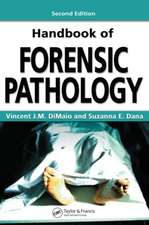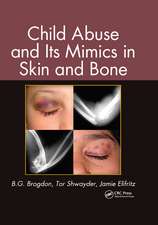Lee and Gaensslen's Advances in Fingerprint Technology
Editat de Robert Ramotowskien Limba Engleză Hardback – 18 oct 2012
Highlights in this edition include:
- Comprehensive details about work performed by the UK Home Office on the use of powders and brushes
- Advances in the area of blood reagents, and the transition from previously carcinogenic peroxidase reagents to new and safer protein staining methods
- The vacuum metal deposition technique
- The cyanoacrylate fuming process
- An update on ninhydrin analogs
- Emerging trends in print development using nanotechnology
- Latent print recovery and decontamination at scenes tainted by chemical, biological, radiological, nuclear, and explosive materials
- A model for quantitatively interpreting and assessing minutiae in a print
- Methods for digital and chemical imaging of latent prints
| Toate formatele și edițiile | Preț | Express |
|---|---|---|
| Paperback (1) | 399.87 lei 6-8 săpt. | |
| Taylor & Francis – 31 mar 2021 | 399.87 lei 6-8 săpt. | |
| Hardback (1) | 866.09 lei 6-8 săpt. | |
| Taylor & Francis – 18 oct 2012 | 866.09 lei 6-8 săpt. |
Preț: 866.09 lei
Preț vechi: 1056.21 lei
-18% Nou
Puncte Express: 1299
Preț estimativ în valută:
165.78€ • 180.13$ • 139.34£
165.78€ • 180.13$ • 139.34£
Carte tipărită la comandă
Livrare economică 21 aprilie-05 mai
Preluare comenzi: 021 569.72.76
Specificații
ISBN-13: 9781420088342
ISBN-10: 1420088343
Pagini: 528
Ilustrații: 197 color images, 19 tables and 5 equations
Dimensiuni: 178 x 254 x 25 mm
Greutate: 1.29 kg
Ediția:Revizuită
Editura: Taylor & Francis
Colecția CRC Press
Locul publicării:Oxford, United Kingdom
ISBN-10: 1420088343
Pagini: 528
Ilustrații: 197 color images, 19 tables and 5 equations
Dimensiuni: 178 x 254 x 25 mm
Greutate: 1.29 kg
Ediția:Revizuită
Editura: Taylor & Francis
Colecția CRC Press
Locul publicării:Oxford, United Kingdom
Public țintă
Academic, Professional, and Professional Practice & DevelopmentCuprins
Part I: Overview of Current Fingerprint Technology. Powder Methods. Amino Acid Reagents. Metal Deposition Methods. Lipid Reagents. Vapor/Fuming Methods. Blood Reagents. Miscellaneous Methods and Challenging Surfaces. Part II: Recent Advances in Fingerprint Technology. Powders for Fingerprint Development. Enhancement Techniques for Fingerprints in Blood. Vacuum Metal Deposition. Cyanoacrylate Fuming Method. Ninhydrin and Ninhydrin Analogues: Recent Developments. Fingermark Detection Using Nanoparticles. Friction Ridge Detection from Challenging Crime Scenes. Statistics and Probabilities as a Means to Support Fingerprint Examination. Digital Imaging. Index.
Notă biografică
Robert S. Ramotowski is currently employed as the Chief Research Scientist in the Forensic Services Division of the United States Secret Service, where he has worked as a research scientist for more than 18 years. His job duties include the coordination of forensic research activities within the laboratory (as well as between other entities, including academia, industry, and other domestic and international law enforcement laboratories), particularly in the areas of latent print visualization, questioned document analysis, instrumental analysis, and ink and paper chemistry. He has published more than two dozen articles on latent print and document chemistry and given or conducted more than 50 lectures and workshops in more than a dozen countries. He was awarded distinguished membership status in the International Association for Identification in 2008.
Descriere
Reflecting the growth in research in fingerprint technology, this third edition begins by reviewing current, widely used techniques along with some older, historical methods. It then describes more recent developments and emerging technologies that have just begun to reach maturity. Highlights in this edition include advances in the area of blood reagents, emerging trends in print development using nanotechnology, latent print recovery, and decontamination at scenes contaminated with chemical, biological, radiological, nuclear, and explosive materials. The book also explores methods for digital and chemical imaging of latent prints.







